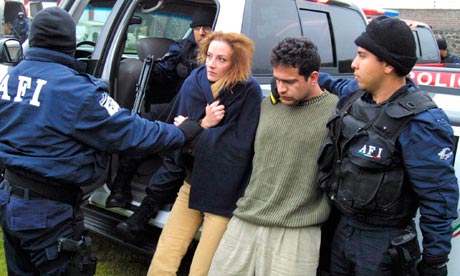
The Mexican ambassador in Paris has walked out of a meeting at the French senate amid an ongoing diplomatic row sparked by Nicolas Sarkozy over a French woman jailed in Mexico on kidnapping charges.
Carlos de Icaza "sadly found himself obliged to leave" the event after France's foreign minister mentioned the case of Florence Cassez, the Mexican embassy said.
"Mexico cannot tolerate that judicial affairs be repeatedly dragged into [other, separate matters]," Icaza said.
France's president has been accused of acting like a banana republic dictator in trying to pressure Mexico to release Cassez.
Sarkozy triggered a diplomatic row by casting Cassez, who recently lost her final appeal against a 60-year jail sentence, as a victim of Mexican injustice and demanding she be moved to French custody on humanitarian grounds.
"We will not abandon her," he said, after welcoming the 36-year-old's parents to the Elysée Palace. He announced that a series of more than 350 events celebrating Mexican culture in France would be dedicated to Cassez, something she had suggested herself.
Mexico's foreign ministry said it would boycott the year-long festival. "It is really surprising that a head of state would make a foreign policy decision that affects ties between two nations and governments in consultation with a person condemned by Mexican justice for a particularly serious crime," said the ministry.
Carlos Fuentes, the Mexican novelist and a former ambassador to France, accused Sarkozy of behaving like a "dictator of a banana republic" in mixing cultural relations with political, judicial and diplomatic ones.
Cassez was convicted of being a member of Los Zodiaco, a kidnapping gang headed by her former boyfriend Israel Vallarta. He has confessed, but she has always insisted she is innocent and that she had no idea Vallarta was a kidnapper.
Born in Lille, north France, Cassez was reportedly made redundant as manager of a local fashion and homeware store in 2003 after which she travelled to Mexico where her brother had set up a company selling medical equipment. She met Vallarta and moved in with him at his ranch on the rural outskirts of Mexico City.
The ranch was at the centre of a dawn police raid on 9 December 2005. Police rescued a woman, her 11-year-old son and a young man being held at the ranch. Vallarta and Cassez were shown live on Mexican TV being arrested.
A few weeks later it emerged that the couple were detained the day before, held incommunicado and then taken to the ranch to be arrested again for the cameras.
The authorities insisted this had no bearing on the case against Cassez, which was based on the testimony of the rescued victims who identified her as an active participant in the gang. Although they had been blindfolded, they said they recognised her foreign accent and got occasional glimpses of her white feminine hands and red hair.
Cristina Ríos and her son were held for 52 days while the gang pressured her husband to pay a 15m peso ransom (£750,000).
"Now I hear Florence demanding justice and shouting her innocence and I hear the voice of the woman who, twisted with jealousy, screamed at her boyfriend when she found him raping me again, and then took her anger out on me," Ríos wrote in an open letter to the press. "The same voice my son recognises as belonging to the woman who drew his blood to send to my husband."
Cassez's lawyers claim the victims only identified her after the scandal over the staged arrest broke and that they were pressured into doing so. Her lawyers plan to take the case to international human rights courts.
The offence taken by many Mexicans over Sarkozy's vociferous lobbying is palpable, despite the general recognition that miscarriages of justice are common in Mexico.
"It is the obligation of the Mexican state to defend our institutions because that is the defence of our sovereignty," María Elena Morera, an anti-crime campaigner, wrote in national daily El Universal.
The case has stirred some very old resentments, filling Twitter feeds with references to the pastry war, a brief invasion by the French fleet in 1838 nominally triggered by the ransacking of a French bakery in Mexico City.
Sarkozy has also come under fire in France despite the widespread sympathy for Cassez.
"He is behaving like an elephant in a porcelain shop ... in just 24 hours he's upset a whole country," said Jean-Marcel Bouguereau in an editorial in La République des Pyrénées.
François Bayrou, the centre candidate during the last presidential elections said the polemic was not helping Cassez. "All these declarations are, I believe, dangerous for Florence Cassez because today all Mexicans feel insulted," he told French radio.
"This brutal diplomacy with excessive declarations is a risk and a danger for her."
The international row comes at a time when French diplomacy is feeling bruised over its failure to get a grip on events in Tunisia and elsewhere in north Africa.
Questions have also been raised over why the French president has adopted Cassez as a cause célèbre as opposed to any of the other estimated 2,500 French prisoners in jail abroad, including at least one facing imminent execution.

